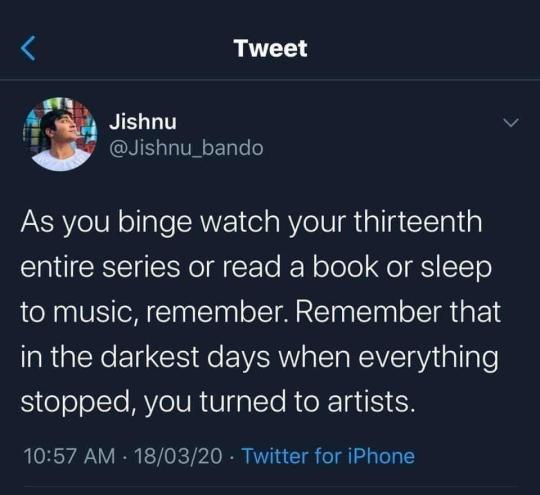Text
“what that mouth do” speak falsehoods mostly, but lately i’ve also been really getting into blaspheming before god,
49K notes
·
View notes
Text
making the UDCU (untitled document cinematic universe)
2K notes
·
View notes
Text
me when the emotionally repressed character is revealed to have had something happen in their childhood that was completely out of their control but changed them in a way they can never come back from

85K notes
·
View notes
Text
I want to see how much of tumblr is ace
Pls reblog if u vote :)
22K notes
·
View notes
Text
It's just very important to me that you know prairie-style gardens exist.










Ok. Thank you. Carry on.
83K notes
·
View notes
Text

People seem to not know how old writers are when they make their stories.
Stephanie Meyer wrote Twilight in 2003, at age 29
Cassandra Clare started writing Mortal Instruments in 2004, at age 31
Rick Riordan published Percy Jackson & the Olympians, the book about 12yrolds, at age 41
George R. R. Martin published A Game of Thrones, at age 48
You can't even use the "but fanfiction isn't real writing" argument because of how many fanfiction turn movies there is. They are clearly enough of a story to be made into published books.
Anna Renee Todd's After series was a Harry Styles fanfiction, which was published in 2014, when she was 25
E.L. James Fifty Shades of Grey series was a Twilight fanfiction, which was published in 2011, when she was 48
Mortal Instruments was a Harry Potter fanfiction.
Why must they act like After someone turns 20 their life ends, like people can't have hobbies???
28K notes
·
View notes
Note
Hi! I just wanted to say I really love your fic, Risen! I just caught up on the last couple of chapters earlier today and I'm so excited for the next one <3 Have a great day/night!!
Thank you so much! It really means a lot to hear that - I appreciate you reaching out! Should have the next bit up soon, hopefully. Have a great day and thanks again ❤️
1 note
·
View note
Text
The Emotion Thesaurus: Adoration
Hello, everyone! I will be starting a new series that will help you the writers describe emotions.
This guide will be a writer’s tool to characters expression.
This section comes from The Emotional Thesaurus by Ackerman and Puglisi.
Adoration
Definition: the act of worship; to view as divine.
Note: the subject of adoration can be a person or thing
Physical Signs:
Lips parting
A slack or soft expression
Waking quickly to erase distance
Mimicking body language
Touching one’s mouth or face
Reaching out to brush, touch or grasp
Steady eye contact, large pupils
Leaning forward
Stroking one’s own neck or arm as a surrogate
Pointing one’s torsos and feet towards the subject
A flushed appearance
Nodding while the subject speaks
Smiling
Open body posture
Releasing an appreciative sigh
Laying hand over the heart
Frequently moistening lips
Pressing palms lightly against the cheeks
Skimming fingertips along the jaw lines
Eyes that are bright
Agreement
Speaking praise and compliments
Keeping trinkets, pictures of the subject
Constantly talking about the subject to others
Rapt attention, still posture
Becoming unaware of one’s environment
A radiant glow
Visible shakiness
Reduced blinking
Closing eyes to savor moment
Speak with a soft voice
A voice that cracks with emotion
Internal Sensations
Quickening heartbeat
Breathlessness
Feeling one’s pulse in throat
Mouth dry
Throat growing thick
Rising body temperature
Tingling nerve endings
Mental Responses
A desire to move closer or watch
Fixating one’s thoughts on the subject
Acute listening and observation
Ignoring distractions
An inability to see the subjects flaws or faults
Cues of Acute or Long-Term Adoration
Obsession
Fantasizing
Believing that the feelings are mutual
A sense of destiny
Stalking
Writing and sending letter, emails, and gifts
Taking risks or breaking laws to be near or with subject
Weight loss
Poor sleep patterns
Jealousy towards those interacting with the subject
Taking on traits or mannerisms of the subject
Carrying something that represents the subject
Possessiveness
May Escalate To:
Love
Desire
Frustration
Hurt
Cues of Suppressed Adoration:
Clenching or hiding one’s hands to hide sweating or shaking
Avoiding conversations about the subject
Watching or observing from afar
Staying out of subjects proximity
Blushing
Sneaking looks at subject
Creating chance run ins
Writing secret letters, keeping diary
Lying about one’s feelings regarding the subject
Writer’s Tip:
Body cues should create a strong mental picture. If the movement is too drawn out or complicated, the emotional meaning behind the gesture may be lost.
Please like, follow and reblog if you find this helpful!
6K notes
·
View notes
Text
Starting Strong Scenes in Your Writing
Scenes are the fundamental building blocks of novels and short stories, and each one should propel a story toward the climax.
Generally speaking, your scene structure should mirror the story structure. In other words, take a novel-writing approach to a scene, crafting a beginning, middle, and end. Like a story, the beginning of a scene should have a strong entry hook that pulls the reader in.
Start with the setting. Often a new scene signifies a change in time and location. Establishing the setting at the top of a scene helps your readers get oriented. It also sets the tone and mood of what will unfold in the coming pages. A setting can serve as much more than a backdrop in literature. Have your scene take place somewhere that builds tension and hinders your protagonist. If you’re writing a thriller, describe a dark and foreboding place where the worst might happen. Be descriptive and use sensory details to make your setting come alive before you jump into the action.
Use visual imagery. In screenwriting, writers have to think in pictures. What images will excite an audience at the top of a scene? Your approach should be the same when writing any kind of fiction. As you write the opening of a scene, use descriptive language to engage a reader through detailed imagery. Think like a screenwriter as you’re writing scenes.
Drop the reader into the middle of the action. Hit the ground running by starting a great scene in media res. It doesn’t have to be a fight scene or a car chase, but physical movement creates momentum and builds tension in a story. It’s also a way to instantly engage a reader. Be sure you begin the scene before the high points of the action so you build up to the scene’s climax.
Write a character-driven scene opener. A good scene starts by giving characters a goal. Start by putting your protagonist in a situation that creates an obstacle or opportunity for both the scene and the overarching storyline. Try starting with dialogue, like an intense conversation between your POV character and a mystery character whose identity is revealed later in the scene. If you’re writing from an omniscient third-person point of view, consider starting a scene with a secondary character, even the antagonist, and use it as a chance for deeper character development.
Summarize past events. You might choose to use the beginning of the scene to do a quick recap of what’s brought your main character to this place and moment in time. A summary is especially helpful if you’re writing in third-person and a new scene switches to a different character. Take the opportunity to remind the reader where we left off. Instead of a straight-forward update, get creative. Go into deep POV and let a character’s thoughts provide the summary instead of the narrator. Be sure to keep this summary brief—just a line or two—so you can get back into the action.
Introduce a plot twist. The start of a new scene is a chance to pivot and take your story in a new direction. Start a new scene at a turning point in your story. Dive into a flashback or character’s backstory, revealing critical information that changes the course of the story going forward.
Keep the purpose of the scene in mind. Effective scenes are clear about what they set out to accomplish and how they contribute to the overall plot. They might include plot points or reveal important information needed to move a story forward. Establish your scene’s intention from the very first word and keep the rest of the scene on point.
Rewrite until you’ve found the perfect scene opening. When you’ve finished the first draft of a scene, go back and read it through. If your scene needs something, but you can’t figure out what, it might be how the scene starts. The best way to know if your opening works is by reading how it plays with the rest of the scene. Review the last paragraph and see if it ties back to your beginning. If the intro feels weak, rewrite it. Maybe your real opener is hidden in plain sight somewhere else in the body of the scene.
Make sure your opening scene is your strongest. While your entire book should be filled with compelling scenes that start strong, the very first scene of your book needs to lead the pack. This is the reader’s introduction to your story and where you’re revealing the characters, the setting, and kicking off the plotline with the inciting incident. This first scene has to hook the reader from the first line so they keep turning the pages.
Read a lot of books. If this is your first novel and you need some inspiration and ideas to help you start off your scenes, start by reading other books. Choose a book by a bestselling writer like Dan Brown or Margaret Atwood. Study the different ways they approach every scene. Reading other authors is a great way to hone your scene-writing skills.
Follow like and reblog if you find these helpful!
6K notes
·
View notes
Note
Hello! I recently found your Jasper x Daryl fanfic. I've only finished chapter one, but I like it! Daryl x OC fics are so underrated. I love getting to know new characters and becoming emotionally invested in their story.
My question is are you going to stick close to TV canon?
I write Daryl x OC fics too, and sometimes, I struggle to stay motivated when I try to write canon compliance.
Hi! Thanks for the question, I’m glad you like the fic!
Since it’s my first fic, the plan is to stay pretty close to cannon, and then use natural gaps in the series to add some of my own stuff that shouldn’t really go against cannon. For example, in the current fic I’ll be focusing a lot on winter, which was kind of skipped over between the farm and the prison, if I remember correctly.
In future fics I might have more courage to do my own thing, but for now sticking to cannon is what I’m most comfortable writing because it allows me to explore the character I’ve created in a comfortable environment.
#thanks for the ask!#daryl dixon x male oc#writers on tumblr#fan fic#ao3 writer#daryl x oc#daryl dixon#the walking dead
3 notes
·
View notes
Text
The fact that I’m autistic even when it’s inconvenient seems to absolutely baffle some people
934 notes
·
View notes
Text
Reasons I like subtitles:
1. I can see how people’s names and the cities and the countries are spelled.
2. I don’t miss any words, so everything they say makes sense.
3. I get to know what background noises and conversations are.
4. The descriptions of the noises people make are freaking awesome. Ex: splutter, grunt, chuckles.
5. I can see who says what.
6. I don’t have to have the volume super loud so I can hear the dialogue, and I don’t blow my eardrums out because the ambient noises and music is SO FREAKING LOUD.
I freaking love subtitles.
112K notes
·
View notes
Text
“create the content you want to see!”
but I’m tired
46K notes
·
View notes



